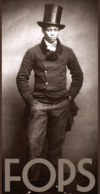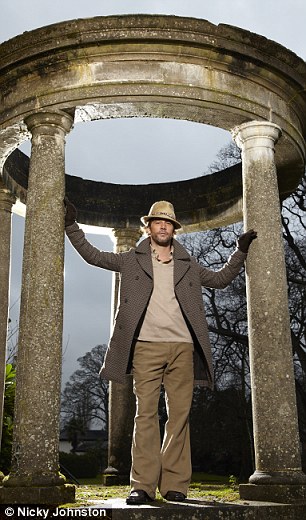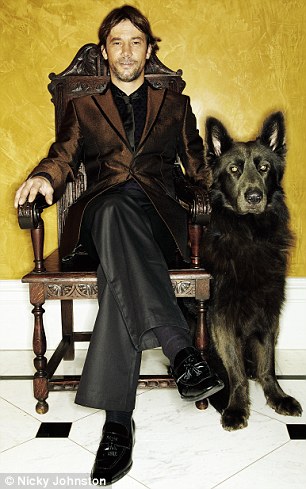
Pop star, makes a fortune, retires to the country and lines lounge walls with leather. So far, so cliched. But a passionate knowledge of his estate’s English civil war history? Jay Kay gives Live a guided tour of his home (and oddly compelling life)
‘I think these days a lot of the younger generation feels that the world owes them something,’ said Jay Kay
It could almost be a scene from a Jane Austen novel. The glorious English countryside in the grip of a cold and bleak midwinter. A heavy mist rolls through the woods, across the fields, over the meadow and onto the lake. The caws of crows and barks of dogs are the only sounds disrupting the eerie peace.
The lord of the manor tours the estate on his trusty steed, surveying his domain, which stretches as far as the eye can see, and then some. Only in this case, the lord of the manor is a platinum-selling, multimillionaire pop star and his steed is a bright green, all-terrain John Deere buggy called a Gator.
With two huge German shepherds bounding along behind him, Jay Kay, the 41-year-old fun-loving, hat-wearing, car-obsessed reformed wild man of pop and leader of the band Jamiroquai, powers the agricultural equivalent of a golf cart around the winding gravel path that leads from his 200-year-old manor house deep into the wilds of his 80-acre estate in the Buckinghamshire hamlet of Horsenden, just south of Aylesbury.
Expression fixed and determined, cigarette hanging from his mouth, he has a destination in mind. Over two moats, past a field of sheep graffitied with his initials, past the charred remains of a serious campfire, he suddenly pulls off the path, stopping next to a Victorian folly.
Hopping out of the Gator onto the folly’s stone plinth, he yanks the cigarette from his mouth, exhales a cloud of smoke and frozen breath and takes in the view.
‘There’s been a house here since 1086,’ he says, pointing back to what, in the realm of pop-star country piles, is a fairly modest ten-bedroom residence.
‘This house dates from the early 1800s. Capability Brown designed the gardens. Except for the moats. Charles I put those in during the English Civil War.’
He takes another drag on his cigarette and nods to the nearest of the watery fortifications.
‘There’s cannonballs in there.’
This is what 25 million album sales looks like. Next to the main house there’s a courtyard flanked by garages, offices, groundsmen’s workshops and Kay’s own pub, The Chequered Flag. Behind the garages, home to only the most precious cars in his now over 30-strong collection, sits a studio where the last four of Jamiroquai’s seven albums, including current release Rock Dust Light Star, have been recorded.
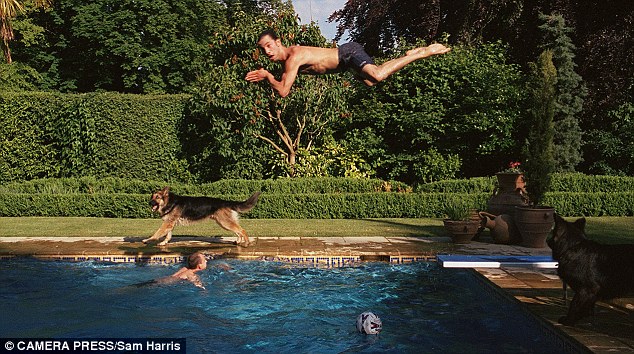
The good life: Kay diving into his swimming pool
Next to the studio, surrounded by terracotta urns and palm trees, is a swimming pool that, with sunshine and a few girls in bikinis, would be all the excuse needed for a party.
After the pool it’s trees and grass and wilderness and nature all the way. Two decades in the music business buys a lot of nature.
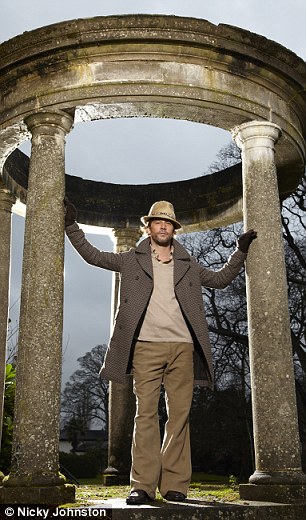
‘Forget the cars and everything else,’ he says. ‘This is what I’m really about.’
Reflection over, he ditches his cigarette and speeds off on foot, leading the way to a miniature stone house, the interior of which consists of a fireplace and just enough space for two easy chairs.
‘This is where a lot of the writing for the album was done,’ he tells me. ‘Every now and again I need to get away from everything. I’m quite a hidey-hole kind of a guy.’
For a minute we debate doing the rest of the interview here or at another hidey-hole, a hut up by the trout lake where, armed with a gas cooker and a tin of beans, he likes to sit and watch the wildlife come and go, but even for him, a self-professed outdoorsy type, ‘it’s too bloody cold’.
‘Forget the cars. This is what I’m really about’: Kay in the grounds of his Buckinghamshire manor house
Fast-forward 20 minutes and the scene is more like something from a Bond film. Pacing his Sixties-inspired living room – complete with chocolate-brown leather tiles floor to ceiling and a tropical fish tank in the wall – Kay is tugging at the cuffs of a Prince of Wales check suit, making himself comfortable, checking the fit. His tailor, Graham Hall, has brought five suits for him to try, including a classic grey flannel and a tuxedo. The lining for the check, Graham tells me, is Ice Blue; the lining of the others is, he says with a glint, ‘Jamiroquai Green’.
‘I can find every jacket under the sun that I like,’ Kay says, straining to admire his leg.
‘But I cannot find trousers cut the way I want them. They’re all really tight at the bottom. Nobody does a boot cut on a trouser leg. It drives me crazy.’
He signals his approval of both fabric and cut to Graham. ‘I am quite fussy about clothes.’
Fashion, he says, is of no interest to him.
‘There’s nothing classic about what’s around now. I am a bit old-school. There are some things that are never out of fashion because they just look good. But if you want classic style these days you have to get it made.’
Likewise, designer clothes, which are ‘overpriced’ and ‘only last five minutes’, no longer hold the appeal they once did.
‘Some of it’s just awful, in terms of fabric, cut and finish, and I’m not being funny, but I’m a man of reasonable means and even I’m horrified by the prices. Four-hundred-and-fifty quid on a jumper? Half the time you could get better at Marks & Sparks.’
Fitting over, Kay picks up the theme and launches into a world-to-rights rant of the kind that only becomes truly satisfying at or around the age of 40. Starting with how designer labels and globalisation have made travel redundant (‘Paris, Tokyo, Kuala Lumpur… Louis Vuitton, Prada, Armani – they’re everywhere’) and ending with some interesting ideas for water conservation (‘Pee in the garden. That would save the five litres you waste when you flush the toilet. Why not? The dog does it’), it’s a hectic stream of consciousness.
When he pauses for breath, something on the television, which has been silently pumping Sky News into the room, catches his attention. Even with the sound off, the seriousness of the breaking news is clear. Kay Burley’s wearing her best ‘shocking events’ face; the ticker says there’s been a stabbing in Ealing, west London.
A policeman and a community-support officer have been injured. On the screen are shots of a high street filled with blue lights and police tape.
‘That’s Ealing Broadway,’ he says after studying the image for a minute, recognising the Tube station where as a teen he used to beg for cigarettes from commuters.
‘It was always quite nice around there. Not posh, but…’ He trails off, shaking his head. ‘Now it’s just depressing.’
Although he was born in Manchester, Ealing was the first place Kay could really call home, moving there at the age of 13 with his mother, Karen Kay, a renowned jazz singer and a regular on Eighties TV variety shows, including her own series.
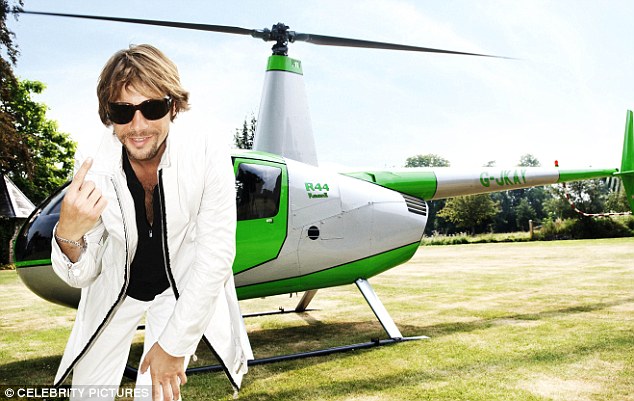
Kay with his Robinson R44 helicopter (registration G-JKAY)
A single parent – Kay wouldn’t meet his Portuguese musician father until he was in his thirties – Karen took young Jason with her wherever in the world the work was, until his need for an education and her need to earn money equalled boarding school.
‘It was a nomadic existence,’ he says of the years spent waiting in dressing rooms and watching his mum play three shows a night in Las Vegas. It was an experience that, he says, instilled in him a love of music with horns, a need to perform and a tireless work ethic.
‘And then it was off to boarding school,’ he shudders, ‘which toughens you up a bit.’
At ten he moved to a second boarding school, ‘mixed this time, thank God. And then we moved to Ealing.
‘We weren’t particularly well off by any stretch, so it had been quite a struggle for my mum,’ he says of why she kicked him out three years later.
‘I left school at 16, and she was like, “OK, you can have a couple of months off to muck around and then that’s it – you’ve got to get a job.”’
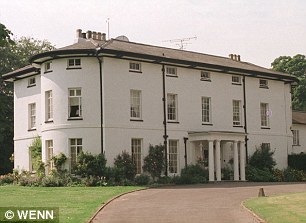
Kay’s home: This is what 25 million album sales looks like
Unfortunately, that couple of months was spent ‘mixing with the wrong crowd’, and after he failed to mend his ways, Karen showed him the door. He lived in a series of squats while delivering pizzas and working in factories – packing toys, bean sprouts and make-up alongside ex-heroin addicts – to pay for demos that would eventually become Jamiroquai’s debut album, 1993’s ecologically themed Emergency On Planet Earth.
Tough though the experience was, he insists it was the making of him, and credits his mum for jump-starting his hustler instinct.
‘I used to talk about music with her and she used to say, “You know, you’re not going to get there singing at the end of a bloody Tube tunnel all day hoping that somebody might come along and discover you. It’s not going to happen. You’ve got to make it happen yourself.”’
Which he promptly did.
From the name and the distinctive Buffalo Man logo to the music, Jamiroquai was 100 per cent Jay Kay’s creation. The name is a compound of ‘jam’, in the musical sense, and ‘iroquai’, a reference to the Native American tribe the Iroquois, who he admired for their philosophy and reverence for the Earth.
He wrote all the songs, despite not being able to play any instruments (even now he sings the parts he wants others to play). And in 1992, after five years of living in squats, he convinced then trendy record label Acid Jazz to release When You Gonna Learn?, the single that subsequently brought him to the attention of Sony Records. They signed him in an unprecedented eight-album deal.
As the images loop on the TV, the significance of watching his beleaguered old manor from the living room of his luxurious pop-star home isn’t lost on him.
‘People see the house and the cars and they forget all the other stuff,’ he says, lighting another cigarette.
‘All this, it doesn’t just get given to you. I think these days a lot of the younger generation feels that the world owes them something. But you’ve got to get off your backside and you’ve got to do all the crap stuff, too.’
Cue another bout of pacing, smoking and free association on the state of the nation, which concludes with him violently stubbing out his cigarette and asking, ‘Am I getting old?’
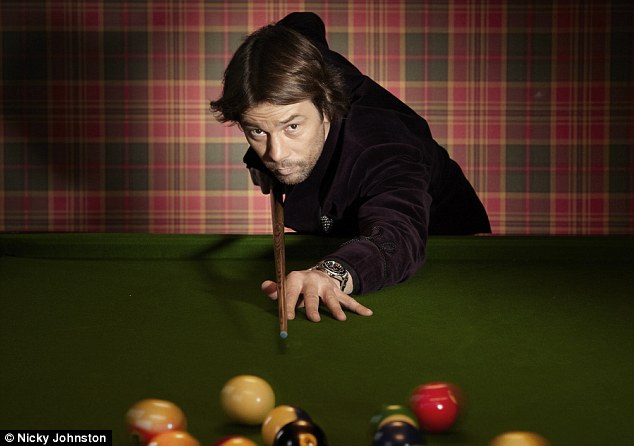
Kay playing pool
Jay Kay has never been short of opinions, nor has he ever shied away from expressing them. Emergency On Planet Earth was full of tree-hugging, anti-war slogans, while defining hit Virtual Insanity contained warnings of the perils of genetic engineering.
Most recently, what he refers to as ‘the X Factor debacle’ ensued when comments he made about Cheryl Cole and Dannii Minogue – he described them as ‘useless’ and questioned their judging authority, saying ‘When have you ever done anything?’ – were printed the day before he was to perform comeback single White Knuckle Ride in front of them on live TV. The column inches then trebled when the pair refused to applaud at the end of his performance.
‘Because that will really devastate me,’ he snorts. ‘“If we don’t clap, we’ll make him feel so bad he’ll never want to work again.”’
He rolls his eyes.
‘Listen, I said it after doing 11 interviews in a row. I got on my high horse a bit. It’s no big deal. These things look worse in print, don’t they?’
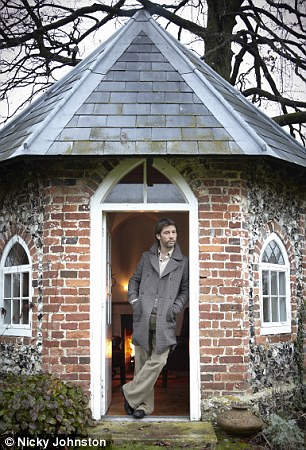
Kay in the miniature house where he writes songs
He offers this not by way of excuse or apology, but merely for context.
One thing he isn’t is apologetic.
‘Just to back up my point, referring to the young lady (Cole), she’s absolutely gorgeous and all the rest of it, but I will say that if you’re on a show like that and you’re the mentor, you shouldn’t mime when you perform on the show. I’ve got to be honest, I don’t know if she did or didn’t – I don’t watch it, I’m just going on what I read in the papers.’
He seemed to strike a chord with the public. Online, newspaper comments sections came alive with readers saying that he had both a point and, given his career, the qualifications to make it.
‘Let’s be honest, it’s not about picking the best singers, is it? It’s about picking who the public can like and dislike and which one’s going to be the fat one we can all laugh at. The whole thing is sodden to the core with Schadenfreude.
‘Are you seriously telling me that there’s no other talent in this country than a 51-year-old Brazilian guy with a bit of a husky voice and staring eyes? You’ve got to be kidding. Go see a south London gospel choir – you’ll find plenty of people who can sing better.
‘It’s a TV celebrity show, not a proper music thing. There’s a difference between the two, though the lines are getting very blurred. But being a musician isn’t about being a TV celebrity.’
It is, however, what the music industry is about at the moment.
‘Which is why I did it. That doesn’t mean I have to sit there all smiles. I’m just a bit more honest than that. Anyway, we’ll see how long these people are stars.’
The X Factor business aside, he’s been conspicuously absent from the newspapers of late. Once a showbiz editor’s dream with his celebrity girlfriends, liking for a drink and well-publicised six-year cocaine habit, which he finally kicked in 2004, he says that the constant attention of the paparazzi – and too many nights in the cells after coming to blows with them – took the shine off partying in London.
He also insists that he’s spent so much of the last three years working on the new album that all he’s been fit for of an evening is walking the dogs, cooking, reading – books on politics or one of the hundreds of classic-car magazines scattered around the house – and watching TV.
As a snapshot of where Kay is in his life, the tracks on Rock Dust Light Star suggest he’s been doing a good deal of stocktaking. An unmistakably personal record, it combines his trademark funk and disco with palpable melancholy and angry bouts of pull-yourself-together attitude.
‘There’s a duality in the music, but there’s a duality in me,’ he says. ‘There’s the dreamer and then there’s the naughty little boy. I’m either the raging life and soul of the party or I don’t want to be there. I do find it a battle sometimes. I think there’s a dark soul in there. I suppose I can be a bit of a depressive. To write songs I have to be at the bottom of the pile and want to fight my way out.’
Did turning 40 influence the album?
‘I think it did. The older you get perhaps the less inclined you are to be quite so guarded. I think it’s a bit closer to the mark of who I am.’
He hesitates, choosing his words carefully, clearly wary of discussing the relationships that account for the album’s sweetest and most melancholic moments.
‘I suppose that’s the point of a song – it’s stuff that you find difficult to say normally.’
His reticence is perhaps understandable. It was his three-year relationship with TV presenter Denise Van Outen that brought Kay the most media attention. Since they split in 2001 he’s stuck to the belief that it’s better to keep his personal life private, and aside from reports briefly linking him to Heidi Klum in 2002 (he will neither confirm nor deny their accuracy, but his grin speaks volumes), he’s managed to keep it that way.
Yet while he won’t be drawn about his current relationship status, he makes no secret of his desire to have children. Sometimes it manifests itself in his typically matter-of-fact speaking manner, as when he explains, ‘Both my parents were adopted, so it’s quite important for me to start a little lineage.’
Sometimes it’s expressed with a wistful sadness that seems to catch even him off guard; pointing out the Italian marble floor in the hall, he says, ‘Cost me a fortune, but I wanted something that’ll last. That floor will be there in 100 years. Now I’ve just got to have some kids so I’ve got someone to leave it to.’
Signs that he is indeed ready to settle down, if not quite to a pipe and slippers, are evident in even the most unlikely area of his life: his cars. Where once the man who claims his proudest achievement is being crowned Top Gear’s fastest Star in a Reasonably Priced Car (beating Simon Cowell) was all about purple Lamborghinis and the latest Ferraris, now he’s carefully curating a collection of classics. In addition to two Sixties Ferraris – a purple 250 GT Berlinetta Lusso, the same model Steve McQueen drove, and an elegant silver 275 GTB/4, a 40th birthday present to himself – he has acquired an impressive Porsche collection. This includes Sixties and Seventies 911s, a pristine black 1955 Pre-A Speedster and a 914/6GT which won its class at Le Mans in 1970.
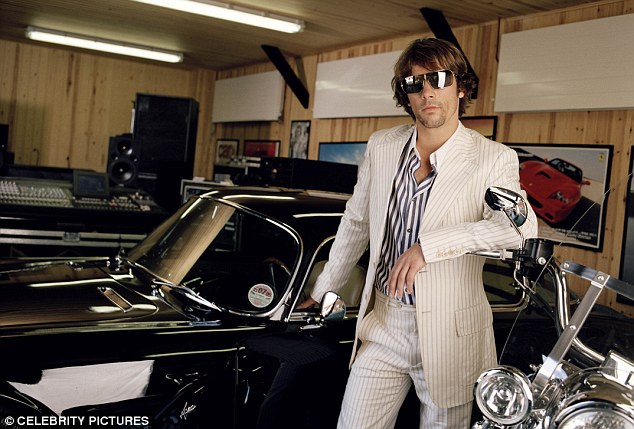 <
Kay standing beside recording equipment and one of his vintage cars
<
Kay standing beside recording equipment and one of his vintage cars
In 2007 Kay drove the Gumball Rally in a brand new Maserati; in 2010 he took part in a more stately jaunt around Italy, the Mille Miglia, in a 50-year-old, award-winning Maserati A6 G54, one of only 19 ever made.
But nowhere is his commitment to style and substance more evident than in the manor itself. He points to a bare wire hanging out of the ceiling where the hall light should be to show me that, despite moving in 12 years ago, he’s still decorating.
‘That’s the thing with this house – it’s never really going to stop. The library’s been waiting to be done for ten years. Still, it was chintzarama when I moved in. If you liked roses on wallpaper, this was the place to come. It looks great now, but for years I lived in a very cold, drafty, chintzy house, which leaked like you’ve never seen. I’ve put a lot of energy and soul into this place.’
Talk of the house brings a calm to him that’s been absent all day.
Kay dated Denise Van Outen for three years. They split in 2001
‘For me it was about space, not the house,’ he says of his decision at 27, when most pop stars are just getting into their partying stride, to spend what in retrospect was a modest £1.5 million on 80 acres in the country.
‘I bought it for sound financial reasons, to build a studio, so instead of paying someone else to use theirs I could charge the record company to use mine. That and I wanted some land so I could have dogs. But yeah, I think I probably jumped the gun a bit.’
What did the neighbours think when he moved in?
‘When they saw me turn up in dark glasses and a purple Lamborghini? I should think they thought, “There are going to be fireworks.” But it’s a case in point, isn’t it? Never judge a book by its cover. Now I lend them my tractor and they say the place has never looked better.
‘A lot of work has gone into tidying it up.’
So much work that, aside from management and PAs, Kay’s full-time staff of eight includes three groundsmen.
‘There’s a public footpath that goes through the back, which the groundsmen make sure is kept nice, and we’ve put in a kissing gate and hedges. Someone’s got to look after these lovely old places. That’s why we’ve got such good birdlife here – kingfishers, egrets, a mandarin duck that comes here every year – because we look after the place.’
Does he ever think about chucking in the music and retiring to his hut by the lake for good?
‘I did consider it a couple of albums ago. But it’s addictive, this job, and I’d get bored twiddling my thumbs. Listen, I am privileged and lucky that people obviously appreciate our stuff enough for us to still be in the game. We’re still rolling. People are still jumping up and down, singing our songs, enjoying them. If it ever becomes just a job…’
He jumps back to his feet as if to accentuate his next point.
‘I can be fed up 23 out of 24 hours, but once it’s showtime, when there are thousands of people going crazy, it doesn’t take long for me to get on it and start leaping up and down on stage like a yo-yo.’
By Dan Gennoe
The single ‘Lifeline’ is out January 31 and Jamiroquai tour the UK in April
